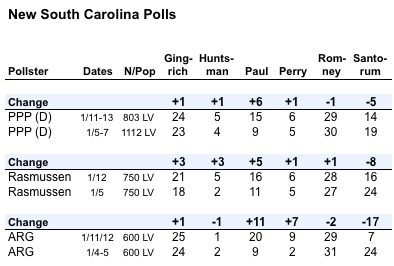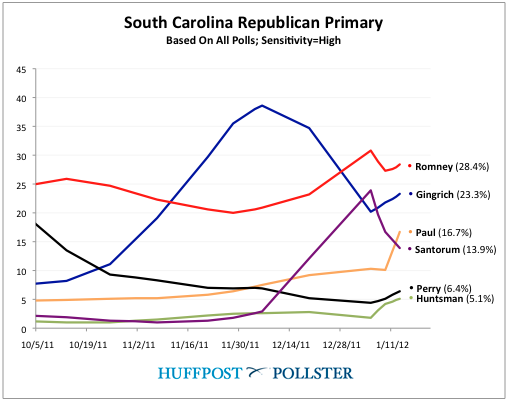WASHINGTON -- Three new surveys of South Carolina Republicans, all conducted since Tuesday's New Hampshire primary, show that the week's events have served to give new momentum to Ron Paul, sharply reverse Rick Santorum's brief rise and leave Mitt Romney running narrowly ahead of Newt Gingrich. While South Carolina remains close and potentially volatile, Romney is positioned for an unprecedented sweep of the first three Republican contests of 2012.
The new polls include automated, recorded voice telephone polls conducted by Rasmussen Reports and Democratic Party-affiliated Public Policy Polling (PPP) and a live interviewer telephone poll from the American Research Group, all conducted from Wednesday to Friday.
Although the surveys differ in their methods, they yield at least four consistent findings. First, all three show Romney with a narrow lead and an almost identical level of support from likely Republican primary voters (28 to 29 percent) that is essentially unchanged from surveys conducted last week before the New Hampshire primary.

Second, all three polls show Newt Gingrich running second, with 21 to 25 percent of the vote, and all three show Gingrich with very slight gains (1 to 3 percentage points) since last week.
Third, all of the polls show Ron Paul making significant gains since last week, although the ARG survey now gives Paul a bigger share of the vote (20 percent) than Rasmussen and PPP (16 percent and 15 percent respectively).
Finally, all three show big drops for Rick Santorum, who had surged in South Carolina following his near tie in Iowa on Jan. 3. The two automated polls give Santorum 14 percent to 16 percent of the vote; the live interviewer ARG poll shows him dropping to just 7 percent.
These trends are illustrated by the chart below, featuring the HuffPost Pollster trend lines based on all public polls in South Carolina. Our current estimate of the standings gives Romney a roughly four point lead over Gingrich (28.4 to 24.3 percent), with Paul (16.7 percent) moving ahead of Santorum (13.9 percent) for second place.

The PPP analysis highlights results it describes as potential "trouble ahead for Romney." These include a small decline in Romney's favorable rating (from 60 to 57 percent) and the results of a new question that found 34 percent saying they would "like the Republican nominee for president to be Mitt Romney" and 58 percent saying they would prefer "someone else."
Romney comes out ahead, however, on a series of hypothetical two-way choices that PPP posed to South Carolina's likely Republican primary voters. He leads by wide margins on match-ups against Gingrich (48 to 37 percent), Santorum (48 to 39 percent), Rick Perry (56 to 31 percent) and Ron Paul (63 to 28 percent). So while a majority of South Carolina Republicans might prefer "someone else" -- or may be using that question to simply restate that their first choice is someone other than Romney -- most will now choose Romney over any of the actual alternatives.
Consistent with that finding is that Romney is currently the most popular candidate on the PPP survey. His favorable rating in South Carolina (57 percent), remains higher than that of Santorum (53 percent), Gingrich (51 percent), Perry (44 percent), Paul (38 percent) and Jon Huntsman (34 percent).
The results leave open considerable potential for late shifts in support, with a third of the voters in the PPP poll (35 percent) saying they might still change their minds. Not surprisingly, that uncertainty is greatest among those supporting conservative candidates Rick Santorum (46 percent) and Rick Perry (48 percent).
But that said, Romney enjoys an enviable position with just a week remaining before voting in a state long considered one of his toughest. Once South Carolina votes, only a tiny fraction of the delegates will have been chosen, but a win for Romney there would leave few significant obstacles in his path to the Republican nomination.